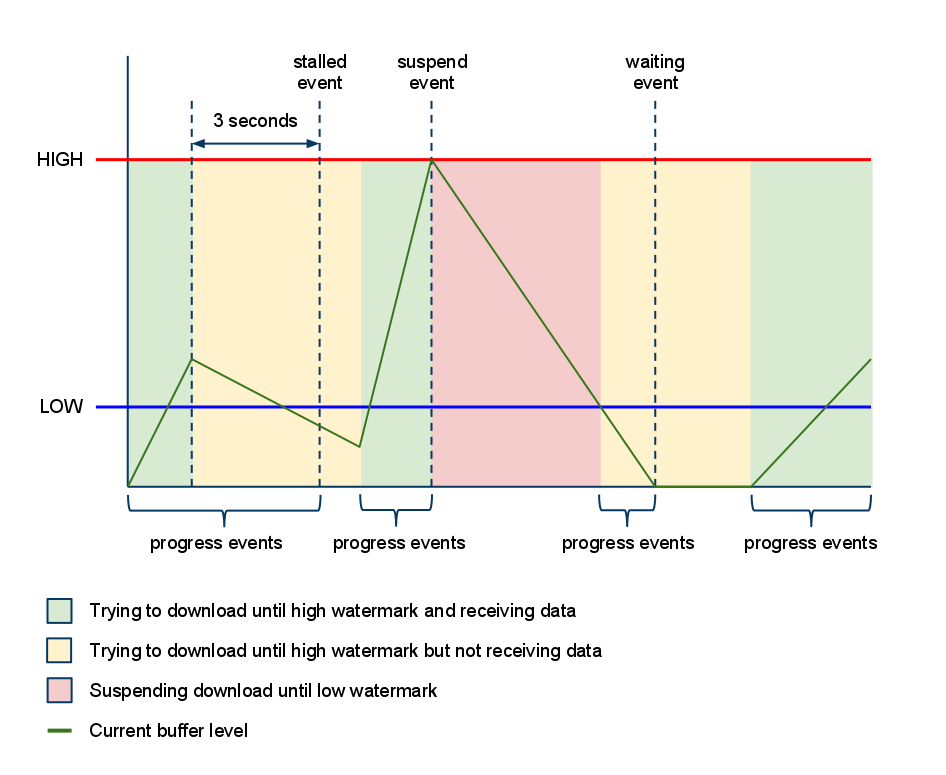Audio/Video
Everything you need to know about audio/video inside Chromium and Chromium OS!
Whom To Contact
It's best to have discussions on chromium-dev@chromium.org or media-dev@chromium.org for media specific matters.
We are component Internals>Media on the Chromium bug tracker.
Documentation
See media/README.md. For historical reference, here's the original design doc for HTML5 audio/video.
Codec and Container Support
Container formats
-
MP4 (QuickTime/ MOV / ISO-BMFF / CMAF)
-
Ogg
-
WebM
-
WAV
-
HLS [Only on Android and only single-origin manifests]
Codec formats (Decode Only)
==Audio==
-
FLAC
-
MP3
-
Opus
-
PCM 8-bit unsigned integer
-
PCM 16-bit signed integer little endian
-
PCM 32-bit float little endian
-
PCM μ-law
-
Vorbis
-
AAC [Main, LC, HE profiles only, xHE-AAC on Android P+, macOS, Windows 11] [Google Chrome only]
==Video==
-
AV1
-
VP8
-
VP9
-
H.264 [Google Chrome only]
-
H.265 [Google Chrome only and only where supported by the underlying OS]
Code Location
Chromium
media/ - Home to all things media! media/audio - OS audio input/output abstractions media/video/capture - OS camera input abstraction media/video - software/hardware video decoder interfaces + implementations third_party/ffmpeg - Chromium's copy of FFmpeg third_party/libvpx - Chromium's copy of libvpx
Blink
third_party/blink/renderer/core/html/media/html_media_element.{cpp,h,idl} - media element base class
third_party/blink/renderer/core/html/media/html_audio_element.{cpp,h,idl} - audio element implementation
third_party/blink/renderer/core/html/media/html_video_element.{cpp,h,idl} - video element implementation
Particularly Interesting Bits
media/base/mime_util.cc - defines canPlayType() behaviour and file extension mapping
media/blink/buffered_data_source.{cc,h} - Chromium's main implementation of DataSource for the media pipeline
media/blink/buffered_resource_loader.{cc,h} - Implements the sliding window buffering strategy (see below)
third_party/blink/public/platform/web_media_player.h - Blink's media player interface for providing HTML5 audio/video functionality
media/blink/webmediaplayer_impl.{cc,h} - Chromium's main implementation of WebMediaPlayer
How does everything get instantiated?
WebFrameClient::createMediaPlayer() is the Blink embedder API for creating a WebMediaPlayer and passing it back to Blink. Every HTML5 audio/video element will ask the embedder to create a WebMediaPlayer.
For Chromium this is handled in RenderFrameImpl.
GN Flags
There are a few GN flags which can alter the behaviour of Chromium's HTML5 audio/video implementation.
ffmpeg_branding
Overrides which version of FFmpeg to use
Default: $(branding)
Values:
Chrome - includes additional proprietary codecs (MP3, etc..) for use with Google Chrome
Chromium - builds default set of codecs
proprietary_codecs
Alters the list of codecs Chromium claims to support, which affects <source> and canPlayType() behaviour
Default: 0(gyp)/false(gn)
Values:
0/false - <source> and canPlayType() assume the default set of codecs
1/true - <source> and canPlayType() assume they support additional proprietary codecs
How the %#$& does buffering work?
Chromium uses a combination of range requests and an in-memory sliding window to buffer media. We have a low and high watermark that is used to determine when to purposely stall the HTTP request and when to resume the HTTP request.
It's complicated, so here's a picture:
